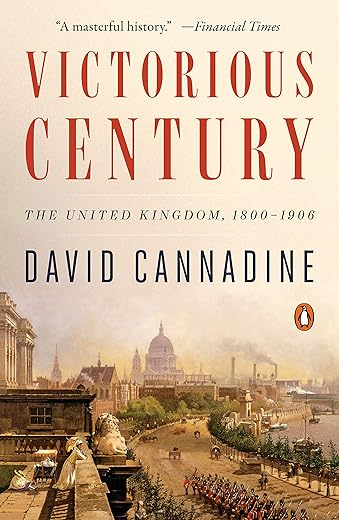
$5.78
Victorious Century: The United Kingdom, 1800-1906 Price comparison
Victorious Century: The United Kingdom, 1800-1906 Price History
Victorious Century: The United Kingdom, 1800-1906 Description
Victorious Century: The United Kingdom, 1800-1906 – Explore the Richness of British History
Unravel the fascinating narrative of British history with Victorious Century: The United Kingdom, 1800-1906. This meticulously researched book, published by Penguin Books on February 20, 2018, offers an in-depth exploration of a pivotal era that shaped the modern United Kingdom. If you’re searching for a detailed account of this transformative time, or simply seeking the best price and reviews, you’ve come to the right place.
Key Features of Victorious Century
- In-Depth Analysis: Dive deep into the factors that influenced Britain’s expansion and power during the 19th century.
- Engaging Narrative: The author presents a compelling storyline that brings historical figures and events to life.
- Comprehensive Coverage: Explore vital social, political, and economic changes that defined the era.
- Pages of Insight: At 619 pages long, this book is packed with information that history enthusiasts will appreciate.
- Enhanced Reading Experience: Features such as Text-to-Speech, Screen Reader support, and Enhanced typesetting are included for modern readers.
- ISBN Information: The print length is supported by ISBN 0525557911 for easy reference.
Benefits of Reading Victorious Century
This book is not just a collection of facts; it’s an immersive journey into a century of triumphs and challenges. Here’s why you should choose Victorious Century:
- Gain a nuanced understanding of the British Empire’s evolution.
- Learn about significant historical events such as the Industrial Revolution and the expansion of British influence.
- Appreciate the cultural shifts that occurred as Britain transitioned into a global power.
Price Comparisons Across Suppliers
The price of Victorious Century: varies significantly among different suppliers. Our price comparison tool conveniently aggregates current prices so you can find the best deal. Over the last six months, the price history chart indicates fluctuations influenced by seasonality and market demand. You’ll notice trends suggesting that purchasing during off-peak seasons may yield better prices. Currently, you can find prices from vendors ranging from $20 to $30, allowing you to pick the option that best fits your budget.
Customer Reviews Summary
Readers of Victorious Century have shared their thoughtful reviews, highlighting both strengths and weaknesses:
- Positive Aspects: Many readers praise the author’s ability to weave together complex themes in a readable format. The inclusion of personal stories alongside historical events adds emotional depth that resonates with many.
- Critiques: Some readers mention that the book can be dense at times, requiring patience to absorb all the information. Additionally, certain historical events are covered more thoroughly than others, which some readers feel could be better balanced.
Explore Unboxing and Reviews
For those considering adding Victorious Century to their bookshelf, we highly recommend checking out the unboxing and review videos available online. These visuals provide an engaging sneak peek into the book’s contents and illustrate the author’s approach to chronicling history. Many viewers appreciate the reviews, which highlight key chapters and critical insights, helping potential readers visualize what to expect.
In conclusion, Victorious Century is a must-have for those passionate about British history or anyone looking to enhance their historical literacy. With its rich narrative, detailed analysis, and engaging style, this book serves both as an educational resource and an enjoyable read.
Whether you are seeking Victorious Century price options or interested in Victorious Century reviews, you are equipped with the tools to make an informed decision.
Compare prices now!
Victorious Century: The United Kingdom, 1800-1906 Specification
Specification: Victorious Century: The United Kingdom, 1800-1906
|
Victorious Century: The United Kingdom, 1800-1906 Reviews (8)
8 reviews for Victorious Century: The United Kingdom, 1800-1906
Only logged in customers who have purchased this product may leave a review.










Nicholas Ratcliffe –
Quite readable. Rather a lot of restatement tho. Excellent bibliographic essay, and a wider than usual consideration of Empire.
Mrs S L Warren –
A comprehensive insight into the century and pulls no punches on living conditions in Great Britain and the Empire. The burden of Empire is put into perspective, particularly the cost of policing it.
Highly informative and digestible for the general reader.
Mark Anderson –
His is a very interesting and worthwhile history of 19th century Britain.
I have audio book version and I’ve deducted one star because I really don’t like the reader’s voice. It’s quite nasal and I find it annoying after a while. One other irritant is the he reads the quotations of 19th century figures in very ponderous and affected tones, almost like he considers these people to have been somehow mentally deficient.
Overall, a worthwhile book but I don’t like the reader on the audio book version.
Apemantus –
in no way a “definitive history” of this time period – rather a cut and paste procession of British Prime Ministers with the obligatory token remarks about the evils of Empire as a bow to the politically-correct stance of the publishers and probably most others in the world of today. Any topics which could have sparked my interest are brushed off with a few lines – most certainly, politics (or rather politicians) are, for the author, what made the nineteenth century, and little if nothing else. The title should have been “British political rulers in the 19th c.” NOT recommended at all as a general overview of the era. At least it was a reasonably cheap price.
John D. Cofield –
I’ll begin my review of Sir David Cannadine’s magnificent history of the United Kingdom in the nineteenth century with a reference to the same book he himself chose to quote as part of his Introduction: Charles Dickens’ A Tale of Two Cities. Just as France in the 1780s and 90s was at a major turning point in its history, so was Great Britain and its possessions during the 1800s. This is a massive work of 530 pages plus suggestions for further reading and an Index (but unfortunately no Notes or formal Bibliography.) The time frame runs roughly from the legislation that formally joined Ireland with Great Britain in one United Kingdom in 1800 through the pivotal General Election of 1906 which installed a large Liberal majority and Government in Westminster.
In 1800 the new United Kingdom was embroiled in an on-again off-again conflict with France that had lasted through most of the preceding century and was now, with the advent of Napoleon, about to enter its most dangerous phase for the British, with the threat of invasion or massive military defeat seeming a definite possibility. The struggle did not end until 1815, leaving Britain as a dominant but not unchallenged major power for the next century. Cannadine ably traces the development of the British nation during that century: noting the successive periods of reform and then retrenchment, the political shifts between Tories (who became the Conservatives) and Whigs (who eventually evolved into the Liberals), the personalities and policies of the Prime Ministers and other leaders, and above all the economic expansion that made Britain at mid century an industrial and commercial giant. The nineteenth century was the heyday of the British Empire, which Cannadine explains grew erratically, usually powered by expansion-minded traders, adventurers, and imperial officials who took matters into their own hands, presenting London with faits accompli which ministers had little choice but to accept, however reluctantly. This was also a century of enormous achievements in the arts and sciences, and Cannadine does a good job chronicling the multitudes of Darwins, Wordsworths, Tennysons, and many others who enhanced British life and learning. The final chapters detail the imperial apogee of the 1880s and 90s and the early years of the twentieth century, addressing the great wealth and prosperity of those years but also covering the growing fear that decline was inevitable and fast approaching Cannadine chose to end his Epilogue with a quote from Kipling’s Recessional, another highly appropriate choice.
I thoroughly enjoyed this book. I appreciated Cannadine’s ability to encapsulate the dramatic changes and critical events of the period in a few paragraphs or pages, as well as the many short vignettes in which he captured the personalities and achievements of politicians like Gladstone, Disraeli, Palmerston, and Salisbury, and I found his descriptions of the many scientists, authors, and artists of the era interesting as well. His depictions of London at the time of the Great Exhibition of 1851 and Ireland during the potato famine of the 1840s, among many others, are vivid and colorful. Victorious Century well deserves its place as part of the nine volume Penguin History of Britain.
William H. Haugland III –
I’ve literally read dozens of books about the British Empire of the 19th Century and this book is the best one I’ve read. It’s well written and researched.
Really enjoyed reading this book.
Veronica R –
Excellent read – gives a broad view of an eventful century although perhaps skewed a little too much towards political history – nevertheless less very enjoyable.
Silenos –
Cannadine has written a mostly good, nearly always fair, in all cases eminently serviceable but primarily political, history of 19th century in the thoroughly traditional style. He clearly is well aware of the work of l’école des Annales but is too devoted to the great men approach to the historical record to do for the United Kingdom what Braudel did for La Méditerranée. It’s not that he does not pay attention to the various mentalités that define the era – he does – it’s that he does not do so sufficiently, and this lack is too readily papered over by the endless cataloguing of the various members of parliament – nearly all Lords at some point of other in their lives – that came to populate the many changes in administration that marked the Victorian century. The tedious telescoping of the by now rightly forgotten names quickly wears on one’s patience.
As such this Penguin book needs to be supplemented. There has been much revisionism of the reign of Victoria since the sixties, much to the despair of its hagiographers, and an excellent recent example I would recommend is Hallie Rubenhold’s brilliant, societally anchored recounting of the lives of the five women that would meet their death at the hands of Jack the Ripper in the 1880s. The four volumes of the Oxford History of English Literature that deal with the period are also recommended for those who believe that a half dozen paragraphs hardly do justice to Dickens or Eliot. And for the heck of it, we could add Alan Moore’s fictional From Hell to the reading list; it does get the underbelly right.
A word about the Kindle edition: while free of errors, it chooses for unknowable reasons to stick the copious illustrations at the very end of the text instead of following the content they properly highlight. A bizarre decision if ever.